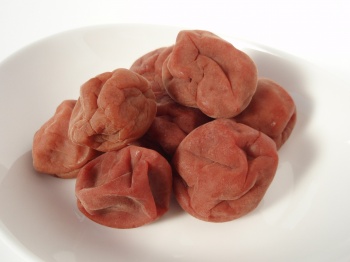Umeboshi
Umeboshi (Japanese: 梅干) are pickled ume fruits common in Japan. The word "umeboshi" is often translated into English as "Japanese salt plums," "salt plums" or "pickled plums." Ume (Prunus mume) is a species of fruit-bearing tree in the genus Prunus, which is often called a plum but is actually more closely related to the apricot. Umeboshi are a popular kind of tsukemono (pickles) and are extremely sour and salty. They are usually served as side dishes for rice or eaten on rice balls (often without removing the pit) for breakfast and lunch. They are occasionally served boiled or seasoned for dinner.
Special Precautions of Umeboshi
Benefits and uses of Umeboshi are
This Japanese style traditional pickle is considered good for digestion, prevention of nausea, and for systemic toxicity, including hangovers. Green ume extract is even used as a tonic in Japan. The citric acid is claimed to act as an antibacterial, help to increase saliva production and assist in the digestion of rice. Additionally, umeboshi is claimed to combat fatigue (historically given as part of a samurai's field ration) and protect against aging.
- Gallbladder attacks resulting from food intolerance
- Stomach upset, as well as morning sickness and motion sickness
- Hangover by more efficiently metabolizing alcohol
- Food poisoning, diarrhea and constipation
- Fatigue by fighting the effects of acid produced during physical activity
- Bowel discomfort caused by intestinal worms, fungi and bad gut bacteria
- Food intolerance, which often leads to other digestive conditions
- Acid/alkaline balance : alkaline fruit has been shown to help balance the acid in your body – acid imbalance is a common problem among vegetarians who consume high levels of grains and nuts. - See
- Antioxidant – fights the negative effects of oxidation
- Antibiotic – inhibits the growth of bacteria
- Antiseptic – prevents infection
- Anti-diarrheal – prevents and/or stops all forms of diarrhea
- Anthelmintic – expels intestinal worms
- Anti-typhoid – fights fever
- Tuberculosis : New York University discovered in 1890 that the citric and malic acids found in umeboshi were effective in the prevention of tuberculosis – a bacterial infection that starts in the lungs and can quickly spread throughout the body.
